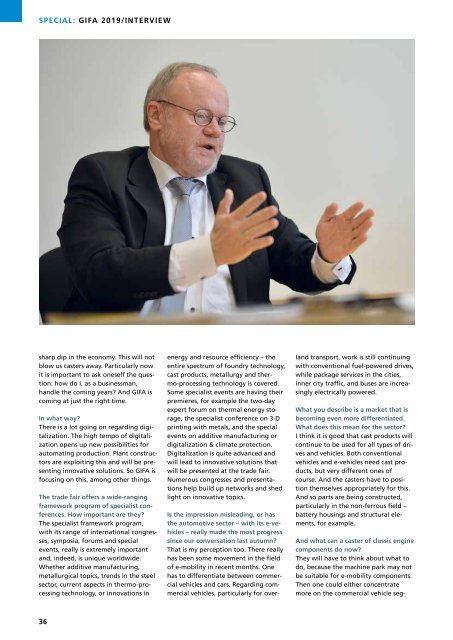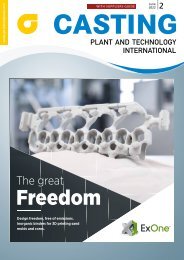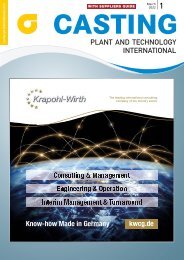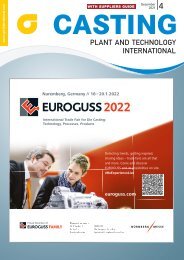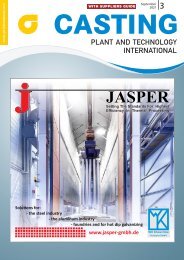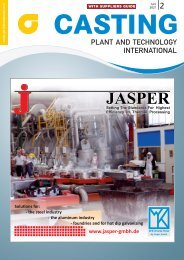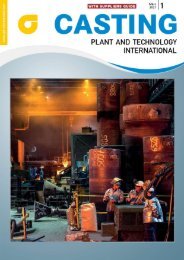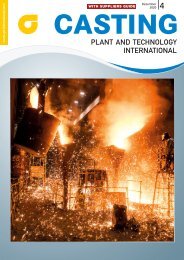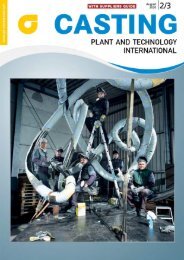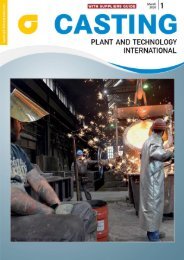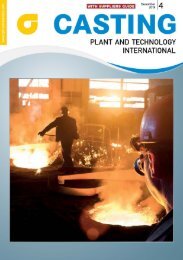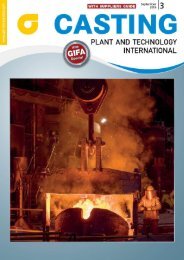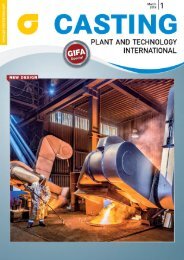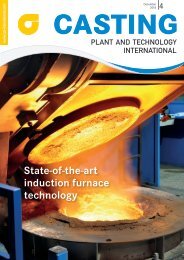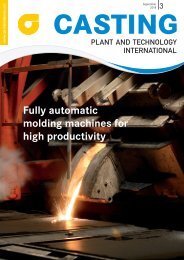CPT International 02/2019
- No tags were found...
You also want an ePaper? Increase the reach of your titles
YUMPU automatically turns print PDFs into web optimized ePapers that Google loves.
SPECIAL: GIFA <strong>2019</strong>/INTERVIEW<br />
sharp dip in the economy. This will not<br />
blow us casters away. Particularly now<br />
it is important to ask oneself the question:<br />
how do I, as a businessman,<br />
handle the coming years? And GIFA is<br />
coming at just the right time.<br />
In what way?<br />
There is a lot going on regarding digitalization.<br />
The high tempo of digitalization<br />
opens up new possibilities for<br />
automating production. Plant constructors<br />
are exploiting this and will be presenting<br />
innovative solutions. So GIFA is<br />
focusing on this, among other things.<br />
The trade fair offers a wide-ranging<br />
framework program of specialist conferences.<br />
How important are they?<br />
The specialist framework program,<br />
with its range of international congresses,<br />
symposia, forums and special<br />
events, really is extremely important<br />
and, indeed, is unique worldwide.<br />
Whether additive manufacturing,<br />
metallurgical topics, trends in the steel<br />
sector, current aspects in thermo-processing<br />
technology, or innovations in<br />
energy and resource efficiency – the<br />
entire spectrum of foundry technology,<br />
cast products, metallurgy and thermo-processing<br />
technology is covered.<br />
Some specialist events are having their<br />
premieres, for example the two-day<br />
expert forum on thermal energy storage,<br />
the specialist conference on 3-D<br />
printing with metals, and the special<br />
events on additive manufacturing or<br />
digitalization & climate protection.<br />
Digitalization is quite advanced and<br />
will lead to innovative solutions that<br />
will be presented at the trade fair.<br />
Numerous congresses and presentations<br />
help build up networks and shed<br />
light on innovative topics.<br />
Is the impression misleading, or has<br />
the automotive sector – with its e-vehicles<br />
– really made the most progress<br />
since our conversation last autumn?<br />
That is my perception too. There really<br />
has been some movement in the field<br />
of e-mobility in recent months. One<br />
has to differentiate between commercial<br />
vehicles and cars. Regarding commercial<br />
vehicles, particularly for overland<br />
transport, work is still continuing<br />
with conventional fuel-powered drives,<br />
while package services in the cities,<br />
inner city traffic, and buses are increasingly<br />
electrically powered.<br />
What you describe is a market that is<br />
becoming even more differentiated.<br />
What does this mean for the sector?<br />
I think it is good that cast products will<br />
continue to be used for all types of drives<br />
and vehicles. Both conventional<br />
vehicles and e-vehicles need cast products,<br />
but very different ones of<br />
course. And the casters have to position<br />
themselves appropriately for this.<br />
And so parts are being constructed,<br />
particularly in the non-ferrous field –<br />
battery housings and structural elements,<br />
for example.<br />
And what can a caster of classic engine<br />
components do now?<br />
They will have to think about what to<br />
do, because the machine park may not<br />
be suitable for e-mobility components.<br />
Then one could either concentrate<br />
more on the commercial vehicle seg-<br />
36


